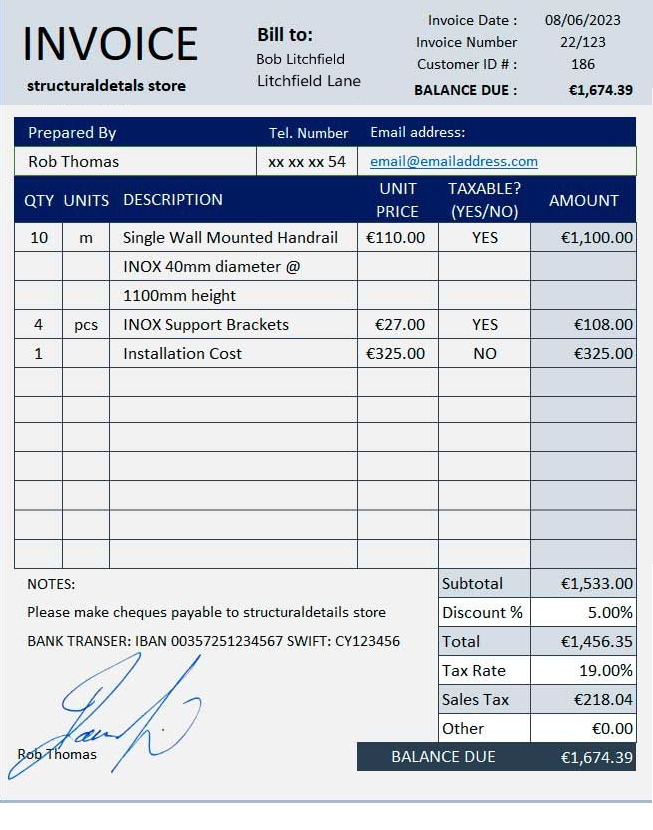And most exciting...
Sumer is based on a fully relational database!
Actually not very exciting unless you are a programmer. Most managers don't know what a relational database is. Not a problem.
You know far more about your own business than any software purveyor. Your management knowledge is key to your business. You just need a way to apply that knowledge.
Software purveyors may hide the whole database concept behind a facade of expertise and jargon while they do all they can to keep a relational database out of your reach.
Here is why...
Technology has changed, business basics not so much...

this invoice for delivery of goods to the palace is recorded on clay

an invoice for delivery of gloves and hosiery to Litchfield manor, 1793, is recorded on paper

an invoice for the handrail on Bob's stairs is recorded as computer blips
but they are all spreadsheets linked in an intuitive virtual database
created by some long-ago genius who invented rows, columns, and totals to build forms and reports
and still used today in businesses based on Microsoft Office or Google Docs
A intuitive virtual database is a manual system, involving a lot of copy and paste, even if using Excel or Google Docs.
And the exact thing that is so easy about spreadsheets—that anyone can get into them and change things, intentionally or not—makes spreadsheet dangerous, even disasterous, as a base for business records.
To take the next step—for computers to deliver full efficiency—data needs to be linked in an explicit RELATIONAL DATABASE in which computers—not managers—do all the work —data goes in easily and securely, without errors, and complete reports come out with no further involvement of office staff.
This improvement in cost and efficiency allows large corporations to swallow their small competitors.
Here is what we should expect from a nursery sales form backed by a true relational database....
- Automatic consecutive numbering of invoice, extensions, and totals,
- A Customer popup that allows on-the-fly editing and adding of new customers... this is the beginning of Customer Relations Management.
- A Price popup, or even an Inventory popup, that allows instant entry of item and price. (Popups ensure fast and accurate data entry.)
-
Automatic posting to reports including:
- a Sales report,
- a real-time Inventory report,
- and Accounting.
And a lot more, because everything is linked to everything.
Setting up a relational database program, however, requires detailed and complex rules and algorithms, written by programmers.
IT IS VERY EXPENSIVE!
( except for Sumer )
Hiring IT staff or contracting a software development company to build custom software is incredibly expensive.
Even worse: statistics show that
"31.1% of software projects are canceled before completion, and 52.7% exceed their original budgets by 189%. This trend is acknowledged by business and IT executives, with 75% anticipating their software projects will fail. Alarmingly, only 16.2% of projects are completed on time and within budget."
Big corporations can afford this, or at least have to put up with it, because once they have that software they can crush their competition.
And if they don't have it, they will get crushed.
An obvious reason for so much failure is that the programmers themselves don't actually understand the business. The geniuses behind the business are the managers, the programmers are more like the guys that bake the clay.
Or you could buy an existing solution from a software purveyor.
But why so expensive?
"The winner is a new class of techno-middlemen, hawking leased hardware and subscription-based software solutions to the public and private sectors. The companies developing the technology have raised billions to impose their 'solutions' onto the unwitting public."
You know, ads like
It's not you! It's your POS!—upgrade to WarpDrive!
When they say they want to "help you explore your needs", they mean they are trying to find out enough about your business that they can pull something off the shelf, repackage it to do more or less what your are already doing, and sell it back to you.
It is expensive—and very profitable—because it is basically a monopoly.
Business software suppliers promise to deliver a more efficient system (they mean 'based on a relational database'), and sometimes they do, but they are not about to let you get your hands on the database.
Huge profits for Big Tech, and crushing costs for SMEs, are because Big Tech software suppliers are what economists call the 'gate-keepers'; they keep the unwashed public out of the high-tech temple.
Small and Medium Enterprise business managers if they had the right tool could more efficiently set up their own relational databases.